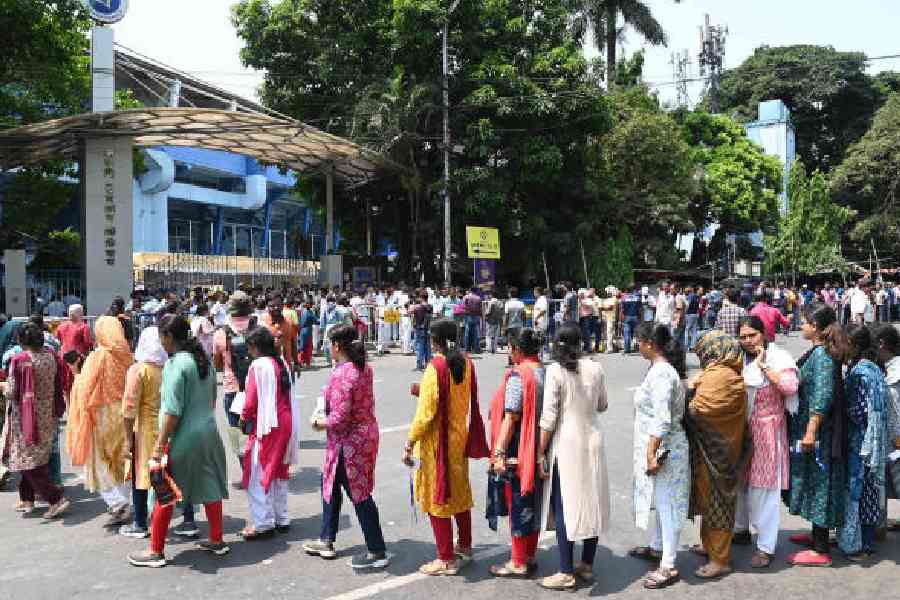Mamata Banerjee on Monday went into politico-administrative firefighting mode to contain the damage from the Supreme Court verdict rendering 25,000-odd jobless, attacking the alleged CPM-BJP nexus to destroy Bengal’s education system and even asking whether some “khyala (game)” was behind the judgment.
“Do not think we have accepted this… our hearts too ache because of the grief you find yourselves in. We are all humans here, and our hearts are not made of stone,” the chief minister told a gathering of thousands rendered unemployed by the judgment.
“Because of this, they could have me incarcerated, but I don’t care. When someone is in trouble, we are not supposed to discriminate against them based on their (political) background… we ought to stand by them instead. We cannot simply dismiss the value and the respect these people deserve,” added the Trinamool Congress chief at Netaji Indoor Stadium. She urged them against getting ensnared by “two-headed serpents” seeking to reap political dividends through provocation.
Asserting that according to the ethics of law, 10,000 people could go scot-free but even one innocent person should not be held guilty, the chief minister said it was the apex court that could ascertain the tally of the allegedly ineligible candidates — eventually suggesting that even the ineligible would not be turned away by her dispensation.
“They started their khyala (game) from 2022… a dirty game. I condemn them, those who snatch jobs but cannot ensure even a single job. You now must understand who is showing their genuine mukh (face) and who has a mukhosh (mask) on,” she said.
Trinamool state president Subrata Bakshi has announced that the party's student and youth wings will hold protests “against the BJP-CPM conspiracy” in every block and ward of the state on Friday. It will be preceded by a mega protest rally between College Square and Esplanade in Calcutta, from 3pm on Wednesday, which sources said might be addressed by Mamata herself.
At the indoor stadium, yet again, Mamata trained her guns at the BJP’s Tamluk MP Abhijit Gangopadhyay, who was a high court judge while this matter was with Calcutta High Court, and CPM Rajya Sabha member Bikash Ranjan Bhattacharyya for his role as a lawyer in this.
“Why will Bikash Ranjan Bhattacharyya not be isolated politically for this? The CPM must answer,” added the chief minister. “There can always be a mistake or two while trying to do the work, but the administration should be given time to rectify, if there are mistakes. We were denied that.”
Mamata sniffed an intrigue rodent and demanded answers on how all those affected by the verdict could be declared “tainted”.
“There is a conspiracy underway to bulldoze our education system. The teachers of Classes IX-XII form the gateway to higher education,” she said.
“Nobody has the right to demolish the education system. How many people were murdered in the Vyapam scam (of Madhya Pradesh)? Eighty-nine. Yet, there is no justice till date. There were countless allegations regarding NEET, but the Supreme Court did not cancel it. Why is Bengal being targeted?” she asked. “You are afraid of Bengal's talent.”
Mamata went on to suggest once again that the apex court’s approach to the matter had changed after Justice Sanjiv Khanna replaced Justice D.Y. Chandrachud as Chief Justice of India.
“…. The then CJI D.Y. Chandrachud had ordered a stay on the Calcutta High Court order. Thereafter, another CJI was appointed, and he rejected the previous order, canceling all the appointments… without considering segregation of the eligible and ineligible,” said Mamata.
“If someone challenges me, I know how to fight. I am not saying anything to the court, as it is not their fault… but the fault of those masked people,” she added. “Is there any khyala behind this verdict? We always hope the Supreme Court will ensure justice.”
Senior political scientist Subhamoy Maitra said Mamata’s Monday exercise was unlikely to have impressed Bengal’s middle and upper classes, but they weren’t her target audience. "She depends on the votes of the lower socioeconomic classes… and to them, she can still say how concerned she is and how much she tried,” said Maitra.











